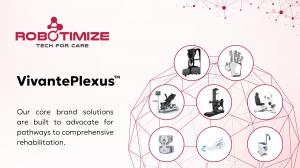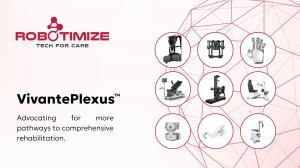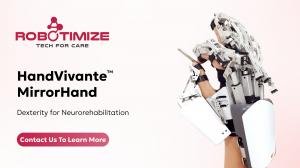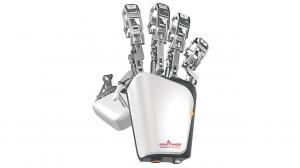Robotimize Advisor Zen Koh Featured on Global Podcast Highlighting the Future of Exoskeletons in Rehabilitation Tech

VivantePlexus™: An integrated, modular ecosystem of intelligent neurorehabilitation technologies transforming care from hospital to home.

VivantePlexus™: Empowering clinicians and patients with interoperable, data-driven rehabilitation tools that personalise therapy and enhance recovery outcomes across the continuum of care.

Zen Koh, global pioneer in rehabilitation robotics and Strategic Advisor at Robotimize, shares insights on scaling exoskeleton innovation and driving human-first neurorehabilitation.
Zen Koh shares insights on scaling exoskeleton adoption, ecosystem collaboration, and human-first innovation in global rehab tech podcast.
As a global pioneer in rehabilitation robotics, Zen KOH has played a transformative role in advancing the field of intelligent neurorehabilitation technologies worldwide. He is the Founder and Executive Director of MotusAcademy, a globally recognised platform dedicated to education, collaboration, and translational adoption of rehabilitation and assistive technologies. He is also the Managing Editor and Editorial Board Member of the Journal of Rehabilitation Methods and Technologies (JRMT). Zen also serves as Ambassador of the International Industry Society in Advanced Rehabilitation Technology (IISART), where he actively promotes global standards, ethical deployment, and interdisciplinary cooperation in rehabilitation robotics. Additionally, Zen holds leadership roles as Strategic Industry Advsior with KITE Research Institute at the Toronto Rehabilitation Institute, part of University Health Network (UHN), contributing to translational research and innovation strategies in neurotechnology.
With decades of experience bridging the gaps between clinical need, technological innovation, and commercial viability, Zen brings unique insights into how wearable robotics can transition from promising prototypes to scalable, clinically validated solutions. In this podcast episode, he reflects on the importance of inclusive stakeholder engagement—spanning patients, clinicians, engineers, entrepreneurs, and policymakers—in shaping a human-first innovation ecosystem. His commentary underscores not only the strategic imperatives for sustainable business models in exoskeletons, but also the broader vision of how collaborative, evidence-based innovation can make these technologies mainstream in global healthcare.
Key themes explored in the episode include:
✅ Transitioning exoskeletons from niche tech to essential rehabilitation tools
✅ Educating and empowering clinicians, engineers, patients, and policymakers
✅ Building scalable ecosystems through neutral platforms like MotusAcademy
✅ The critical role of RehabWeek 2025 in driving multi-stakeholder engagement
✅ Market education as the catalyst for long-term growth and clinical adoption
Listeners will find Zen’s candid reflections and strategic perspectives both inspiring and actionable—particularly in a field where collaboration, clinical validation, and long-term vision are essential to success.
Non-ionizing Radiation EMF Detection, Measurement, and Safety Market to Hit USD 111.8 Billion by 2035 at 4.1% CAGR
Lumenica by Vergunovs and Maria Kolesnikova Wins Bronze in A' Lighting Products and Fixtures Design Award
Orthopedic Surgical Navigation Systems Market Projected To Witness Substantial Growth 2025-2032: OrthAlign Inc, EPED Inc
Więcej ważnych informacji
 Jedynka Newserii
Jedynka Newserii

 Jedynka Newserii
Jedynka Newserii

Handel

Mercosur to tylko wierzchołek góry lodowej. UE ma ponad 40 umów handlowych, które mogą destabilizować rynek rolny
Umowa handlowa między UE a krajami Mercosur może znacząco zaburzyć konkurencję na rynku rolnym i osłabić pozycję unijnych, w tym polskich, producentów – ostrzegają rolnicy i producenci żywności. Umowie sprzeciwia się część krajów unijnych, które domagają się klauzuli ochronnych oraz limitów importowych. – Problemem jest jednak nie tylko ta konkretna umowa. Chodzi o cały system wolnego handlu, który się kumuluje z dziesiątek innych porozumień – podkreśla Andrzej Gantner, wiceprezes Polskiej Federacji Producentów Żywności.
Firma
Dzięki zdalnej weryfikacji tożsamości z wykorzystaniem AI firmy zminimalizowały liczbę oszustw. Rozwiązania wykorzystuje głównie sektor finansowy

Z najnowszych danych Eurostatu wynika, że w 2024 roku 5,9 proc. polskich firm korzystało z rozwiązań z zakresu sztucznej inteligencji. W 2023 roku był to odsetek na poziomie 3,67 proc. Wciąż jednak jest to wynik poniżej średniej unijnej, która wyniosła 13,48 proc. Jednym z obszarów, który cieszy się coraz większym zainteresowaniem wśród przedsiębiorców, jest weryfikacja tożsamości przez AI, zwłaszcza w takich branżach jak bankowość, ubezpieczenia czy turystyka. Jej zastosowanie ma na celu głównie przeciwdziałać oszustwom i spełniać wymogi regulacyjne.
Prawo
Daniel Obajtek: Własne wydobycie i operacyjne magazyny to filary bezpieczeństwa. Zgoda na magazyny gazu poza krajem to rezygnacja z suwerenności energetycznej

Były prezes Orlenu ostrzega przed zmianami w ustawie o zapasach ropy naftowej, produktów naftowych i gazu ziemnego. Jego zdaniem przygotowana przez rząd nowelizacja tzw. ustawy magazynowej i ujednolicanie unijnej polityki energetycznej to zagrożenie dla bezpieczeństwa energetycznego Polski. W jego opinii tylko silna spółka narodowa, własne wydobycie, krajowe magazyny i zbilansowany miks energetyczny zapewnią Polsce bezpieczeństwo i konkurencyjność.
Partner serwisu
Szkolenia

Akademia Newserii
Akademia Newserii to projekt, w ramach którego najlepsi polscy dziennikarze biznesowi, giełdowi oraz lifestylowi, a także szkoleniowcy z wieloletnim doświadczeniem dzielą się swoją wiedzą nt. pracy z mediami.






![Nestlé w Polsce podsumowuje wpływ na krajową gospodarkę. Firma wygenerowała 0,6 proc. polskiego PKB [DEPESZA]](https://www.newseria.pl/files/1097841585/fabryka-nesquik_1,w_85,r_png,_small.png)



.gif)

 |
| |
| |
|